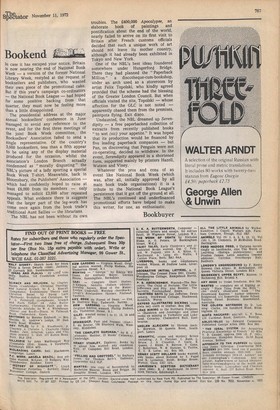Bookend
In case it has escaped your notice, Britain IS now nearing the end of National Book Week — a version of the former National Library Week, restyled at the request of booksellers and publishers, who wanted their own piece of the promotional cake. But if this year's campaign co-ordinators — the National Book League — had hoped for some positive backing from that quarter, they must now be feeling more than a little disappointed.
The presidential address at the major annual booksellers' conference in June managed to avoid any reference to the event, and for the first three meetings of the joint Book Week committee, the Booksellers' Association failed to send a single representative. Of the country's 3,000 booksellers, less than a fifth appear to be using any of the display material Produced for the occasion, whilst the association's London Branch actually condemned as "morally disgusting" the NBL's picture of a lady sporting a special Book Week T-shirt. Meanwhile, back in Bloomsbury, the Publishers' Association — Which had confidently hoped to raise at least £8,000 from its members — only managed to solicit £3,600 after repeated appeals. What evidence there is suggests that the larger part of the leg-work has come once again from the book trade's traditional Aunt Sallies — the librarians.
The NBL has not been without its own
troubles. The £400,000 Apocalypse, an eilaborate book of paintings and pontification about the end of the world, nearly failed to arrive on its first visit to Britain after French customs officials decided that such a unique work of art should not leave its mother country, although it had already been exhibited in Tokyo and New York.
One of the NBL's best ideas foundered somewhere under Hungerford Bridge. There they had planned the "Paperback Million" a discotheque-cum-bookshop, under an arch used as a storeroom by artist Felix Topolski, who kindly agreed provided that the scheme had the blessing of the Greater London Council. But when officials visited the site, Topolski — whose affection for the GLC is not noted — apparently chased them from the premises, paintpots flying. Exit disco.
Undaunted, the NBL dreamed up Serendipity — a free paperbacked collection of extracts from recently published books "to wet (sic) your appetite." It was hoped that its production would be financed by five leading paperback companies — but Pan, on discovering that Penguin were not co-operating, decided to withdraw. In the event, Serendipity appeared in a shortened form, supported mainly by printers Hazell, Watson and Viney.
Whatever the pros and cons of an event like National Book Week (which was, after all, initially approved by all main book trade organisations) it is a tribute to the National Book League's persistence that it got off the ground at all. The NBL's continued and underfinanced promotional efforts have helped to make this writer, for one, an enthusiastic.
Bookbuyer


















































 Previous page
Previous page